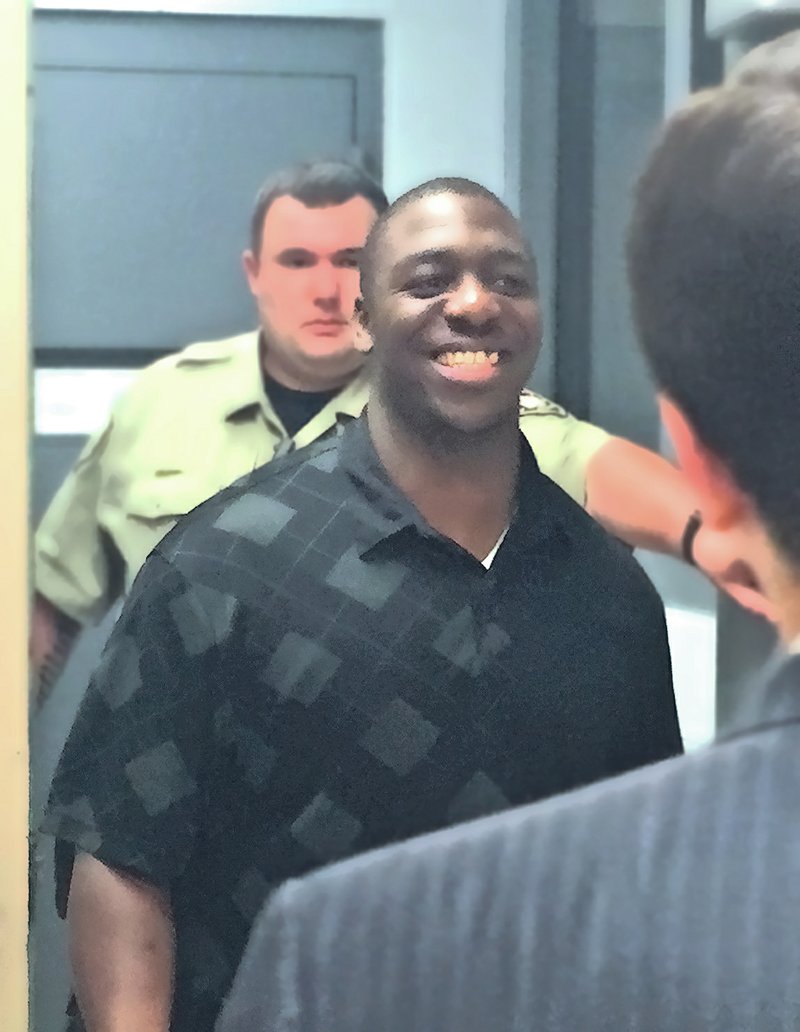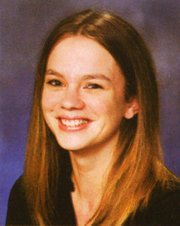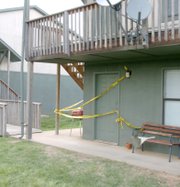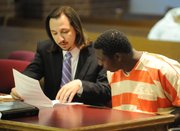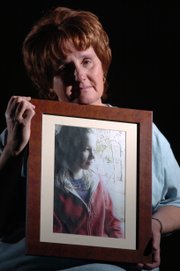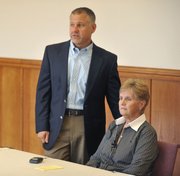FAYETTEVILLE -- Rico Cohn spent three years in jail awaiting trial on capital murder charges based on the memory of one witness, who told police six years after the killing that Cohn had confessed to her.
Prosecutors, citing insufficient evidence, dropped all charges against Cohn on July 1 after that witness, Randee Applewhite, died after surgery.
Nolle Prosequi
Latin for “we shall no longer prosecute,” this is an entry made on the record by a prosecutor in a criminal case stating that he will no longer pursue the matter. The statement is an admission that the charges cannot be proved or that evidence has demonstrated either innocence or a significant flaw in the prosecution’s case. A nolle prosequi is not an acquittal, and the defendant may later be re-indicted on the same charge if new evidence surfaces.
Source: Staff report
Timeline
April 21, 2006 — Bethany Nina June Ingram, 21, is last seen alive between 11:30 p.m. and midnight when she left her job at the Sixth Street Wal-Mart Supercenter. She spent time with her boyfriend, Josh Stewart, before returning to her apartment.
April 22, 2006 — Noah Ingram, Nina’s brother, finds her body in the bedroom of her apartment at the Law Quad, 701 W. Sycamore St. Autopsy determines the cause of death was strangulation by ligature.
July 2, 2006 — Fayetteville police say DNA evidence analyzed by the Arkansas State Crime Lab has not yielded any leads.
December 23, 2007 — Fayetteville police say they have new DNA evidence that may help identify or eliminate suspects. The sample is sent to the FBI.
April 22, 2010 — Police say the investigation remains open. Evidence taken from the crime scene is still being analyzed by the FBI to obtain a different DNA profile.
June 6, 2012 — Police arrest Rico Tavarous Cohn, 26, of Springdale, in connection with capital murder. Cohn is jailed without bond. Police say media reports in April on the anniversary of the murder led to information allowing them to develop Cohn as a suspect.
June 20, 2012 — Cohn enters a not guilty plea before Magistrate Ray Reynolds. Judge sets trial for Aug. 20.
September 24, 2013 — Cohn’s defense team, including Tony Pirani and Kao Lee, asks the judge to declare the death penalty unconstitutionally cruel and excessive, arbitrary and capricious. Washington County Circuit Judge William Storey denies defense motions. Prosecutor John Threet says he hasn’t decided whether to seek the death penalty.
December 31, 2013 — Cohn is found mentally fit to stand trial. Cohn tells doctors he is innocent and does not want to pursue a mental disease defense.
January 27, 2014 — Storey grants a request to allow experts hired by the defense to test the state’s evidence in the case. According to the motion, evidence they see as critical has never been tested at the State Crime Lab.
October 17, 2014 — Ongoing testing delays the trial.
January 1, 2015 — Cohn’s case is transferred to Judge Mark Lindsay.
January 30, 2015 — Ongoing testing by defense delays trial again.
March 3, 2015 — Randee Applewhite, the state’s key witness in the case against Cohn, dies unexpectedly following surgery at Northwest Medical Center in Springdale.
July 1, 2015 — Cohn, now 29, walks out of the Washington County Detention Center at 9:38 a.m. after capital murder charge him is dropped.
"After she died, we had nothing," said Prosecuting Attorney Matt Durrett. "Her testimony led to other witnesses who could corroborate her story. She knew things nobody else knew, we lost all that stuff."
Durrett said he felt comfortable with the case he had before Applewhite died.
"If there wasn't enough there, we'd have dropped it a long time ago," Durrett said. "I trust the evidence we had this February, before Randee died. If Randee hadn't died, we'd still be trying this case."
Tony Pirani, the former deputy public defender who helped win Cohn's release, is convinced the case was botched almost from the beginning. The result, Pirani said, has been an injustice to the murder victim, 21-year-old Bethany "Nina" Ingram, her family and Cohn.
"The bottom line for us is, and I try to be diplomatic, this case was always bad and we've been telling them that literally for years and, somehow, this train wreck just kept moving forward," he said. "It's been frustrating not to be able to show how weak this case was."
Cohn, 29, is back home in Tennessee, staying with his mother, looking for a job and trying to pick up the pieces. He was arrested June 6, 2012, and had he been convicted of capital murder, he faced life in prison without parole or death.
"Right now, I'm trying to rebuild my life. I had my own life torn apart for no reason, and I'm having a rough time trying to rebuild and put things back together," he said. "There's three years of my life that I can never get back and it's something I'm probably going to be scarred from for the rest of my life."
Prosecutors nol prosequi the case when they dropped the charges, which would allow it to be re-filed for up to a year if new evidence is obtained.
Prosecutors never sought a delay in bringing the case to trial. The defense asked for several delays in order to secure test results. One delay was caused by a change of judges.
Fayetteville police say they are maintaining an open investigation into Ingram's murder.
Police and Judy Ingram, Nina Ingram's mother, said they hope new evidence will turn up and charges will be refiled.
"When is Nina going to get justice?" Judy Ingram said after Cohn's release. "I have no doubt in my heart that Rico is the man who took Nina's life."
Ingram said she hoped someone else would step forward because justice hasn't been served. Cohn is dangerous, Ingram said at a press conference.
"I have been waiting and waiting and waiting for closure," Ingram said. "This is not the closure I wanted."
The defense team isn't done with the case either. They're still investigating and having evidence tested and hope to be able to present evidence to the police that will lead to the arrest of Ingram's killer, Pirani said.
"This investigation does not need to be closed," Pirani said. "I just don't believe that Rico did it. If I'm right, there's still a killer out there."
Randee's Story
The prosecution's case hinged on Applewhite's memory being triggered six years after Ingram's 2006 slaying by a story about the unsolved case. Judy Ingram reminded media annually about her daughter's unsolved case.
Applewhite remembered several things she said Cohn told her about six months after the death. The two had a relationship while Applewhite and her husband were having marital difficulties, she told police.
Applewhite told a friend, Brenda Case, she had information about the murder. Case then called a police tip line.
Applewhite eventually told police Cohn admitted to her that he killed Ingram.
Applewhite was reluctant to tell police much at first, according to court records. She had been a witness in a previous murder trial, when her boyfriend at the time, Byron Acey, shot and killed her best friend, Terell Mitchell, in a Fayetteville parking lot in 1999. She told police she feared Cohn, didn't want to be drawn into the case and did not want to testify.
"Because I know what he can do, and I have children and like I said, I know her family wants closure but, you know, like I said, their daughter is gone but my children are not, so for the safety of me and my children I kept it to myself," Applewhite said in a 2012 police interview.
"And plus I didn't -- I didn't know one hundred percent if it was true or not -- you know what I'm saying -- he could just be bragging."
Durrett said Applewhite's story remained consistent throughout.
"She never once said anything other than that to us, other than what he told her," Durrett said. "She said she didn't know what happened -- if he did it or not -- because she was not there."
Murder Tales
Ingram was last seen just before midnight on April 21, 2006. Investigators believe she left her job at the Walmart Supercenter on Martin Luther King Jr. Boulevard and spent time with her boyfriend before returning to her apartment.
A Texas native, Ingram moved to Fayetteville with her mom and two brothers for her freshman year of high school, while her dad and other brother remained in Lillian, Texas. She graduated from Fayetteville High School in 2002.
Ingram attended Northwest Arkansas Community College after high school, where she was majoring in business.
Ingram's brother found her body April 22, 2006, on her bed in her apartment on Sycamore Street, according to police records.
Autopsy results cited strangulation by ligature as the cause of death. The medical examiner said the attack on Ingram was so sudden and violent she had no time to fight back. There were no signs of a sexual assault, and police said there was no sign of forced entry.
Police said they believed Ingram was killed because she rebuffed Cohn and others who made inappropriate comments to her as she left her apartment five days before her death, according to records. One witness told police Cohn was upset because Ingram thought she was too good for him. Cohn felt Ingram had been "disrespectful," according to records.
In Applewhite's interviews with police, she said Cohn told her he was going to buy marijuana at the apartment complex a few weeks after the initial encounter with Ingram when he saw her arrive home. He knocked on her door and, when she opened it slightly, he shouldered his way in, strangled her and wiped down the door and door knob then left.
Afterward, Cohn went to a friend's home where he watched the news to see if Ingram was dead or not, Applewhite recounted.
"When he looked at me and told me, and the way he looked me in my face and told me, it felt real," Applewhite told investigators.
She told police Cohn said he choked Ingram to make a point and before he knew it, she was dead. Applewhite said Cohn had scratches to his neck and chest, a broken knuckle and bloody cuticles when she saw him shortly after Ingram's death.
Cohn was described in police interviews by Applewhite and two other women he dated, Cathleen Slaughter and Margarite Hood, as having a quick, violent temper and being very controlling and jealous.
Applewhite said Cohn once grabbed her by the throat, picked her up off the floor and choked her. He also put a gun in her face and sabotaged her car, she said. Slaughter and Hood also claimed in police interviews that Cohn choked them.
None of the domestic incidents were reported to police.
Tunnel Vision
As time went on, Pirani contends, Applewhite's story become more embellished.
"Her testimony at trial was not going to be in line with that statement," Pirani said. "She was going to testify she did not believe Rico committed that crime and Rico never said 'I killed Nina Ingram.' She made some assumptions. People say a lot of things for a lot of reasons. I'm not in her head."
Cathleen Slaughter also told police Cohn told her he killed Ingram, but after talking with Slaughter again, prosecutors decided there were too many problems and inconsistencies with her testimony. For example, Slaughter said Cohn told her he had shot Ingram.
Slaughter's statements were never credible and her statements did not match Applewhite's story or the crime scene, Pirani said.
"There was nothing to back up what those girls were saying," he said.
Prosecutors had no DNA evidence. There were no fingerprints. Cohn passed a lie detector test commissioned by the defense.
The state crime lab mislabeled and misplaced evidence and potential witnesses were never talked to, Pirani said.
The crime lab said there was no DNA, but independent testing by the defense found a small amount, likely not enough to produce a profile for comparison purposes. The defense is still trying to get a usable profile from that sample, Pirani said.
"It was like something out of a bad movie," he said. "The more we looked at it, the more things we found that just didn't make sense."
Investigators had cognitive bias, or tunnel vision, and this was a textbook case for how not to do an investigation, Pirani said. Police had their suspect and would not consider the many things that did not match up.
Pirani is not completely happy with the way the case ended because it did not give Cohn a chance to rebut charges in order to clear the cloud of suspicion surrounding him. The defense asked Judge Mark Lindsay for a full and complete dismissal, which was not granted.
"There is a presumption of innocence. Rico's presumed innocent, and he is innocent in the eyes of the law, but there has been no trial," Pirani said.
"We wanted the trial so everyone could see what we see, that there is no credible evidence. If all this had been presented, everyone in the courtroom would have realized he was not guilty. There would have been no doubt, it's just not there."
Pirani said he'd like to be able to lay out the defense's case for Ingram's family, including the existence of an individual whose name has come up at least three times in the investigation since 2008. Neither Pirani nor authorities would identify the person.
He advised Cohn not to talk about the case in media interviews because it could be refiled.
Not So Speedy Trial
Cohn was in jail for three years because the trial was postponed eight times, most for additional evidence testing by experts hired by the defense.
Durrett said prosecutors never sought a delay in the case and did not object to additional testing.
"If the evidence points to someone else or another direction or clears someone, we need to know that, too," he said. "The evidence is what it is and if it points in a different direction, so be it."
Durrett said the prosecution doesn't benefit from delays, particularly in a 9-year-old case, because people often leave the area and memories fade.
"We're responsible for getting it right," Durrett said. "There's nobody out there that fears a wrongful conviction more than a prosecutor. I don't want that burden of locking an innocent person up on my head."
After Applewhite died in March, prosecutors said they waited until June to drop the charges hoping to find other witnesses they felt comfortable with going to court.
Slaughter had told police Cohn once told her he killed Ingram but after tracking her down and talking with Slaughter again, prosecutors decided there were too many problems and inconsistencies with her testimony.
For example, Slaughter said Cohn told her he shot Ingram, bought pills from Ingram and had a prior relationship with Ingram. Prosecutors decided there was no evidence any of those things had happened.
Criminal Past
Cohn moved to Fayetteville for a job in March 2005 after a stint at the Cass Job Corps in Franklin County. He worked a series of low-paying jobs, moving frequently and often staying with friends.
Scott Conduff, owner of a construction company, said Cohn worked for him "on and off " for a couple years as a general laborer and was a good employee.
"It blew me away," he said of the arrest. "It seems completely out of character. He's just a nice guy. He's the kind of person who would walk up to a stranger, shake their hand and ask how their day was going."
"For someone to tell me that Rico killed someone, that just doesn't compute," he said. "I would have to see the facts."
Cohn is a convicted criminal. He was arrested in late 2005 for possession of cocaine. He pleaded guilty April 24, 2006, three days after Ingram was killed, and was sentenced to three years probation and fined $1,000.
His probation was revoked in October 2006 for not reporting to his probation officer, failing a drug test and not making timely payments on his fine and fees. He was sentenced to 10 years with eight suspended. Prosecutors said Cohn served about nine months.
Cohn was convicted again in May 2009 of possessing marijuana and was sentenced to 120 days and fined $1,000.
In November 2009, Cohn pleaded guilty to delivery of marijuana and was sentenced to 10 years in prison with five suspended. He was given credit for 27 days served in jail and served about 9 months.
True Blessing
After 1,121 days sitting in jail, Cohn asked for a hamburger and ride to his mother's house.
"It was the best feeling in the world," Cohn said in a July 20 phone call. "It was like it went from no hope to hope. It was a true blessing."
"I am innocent," Cohn said. "I don't know anything about this. All I know is I was throwed in jail for it."
Cohn hugged his lawyers and supporters as he walked out of the Washington County Jail a free man, a cell phone video shows.
"It was a pretty incredible moment. He wanted to eat, so we went to Sonic," Pirani said.
Another cell phone video documents the emotional reunion with his mom, who had last seen him July 4, 2011. Cohn celebrated the holiday this year with her and other family members.
"We had a handful," Cohn said. "I got to see my grandmother and my uncles and aunts and a lot of cousins. It was fun."
Cohn said his grandfather and several other family members passed away while he was in jail.
He said he feels Ingram's family has been denied the justice and closure they deserve.
"I feel the pain and what the family is going through, and I will continue to keep their family in my prayers and pray that justice is served," he said.
NW News on 08/02/2015
